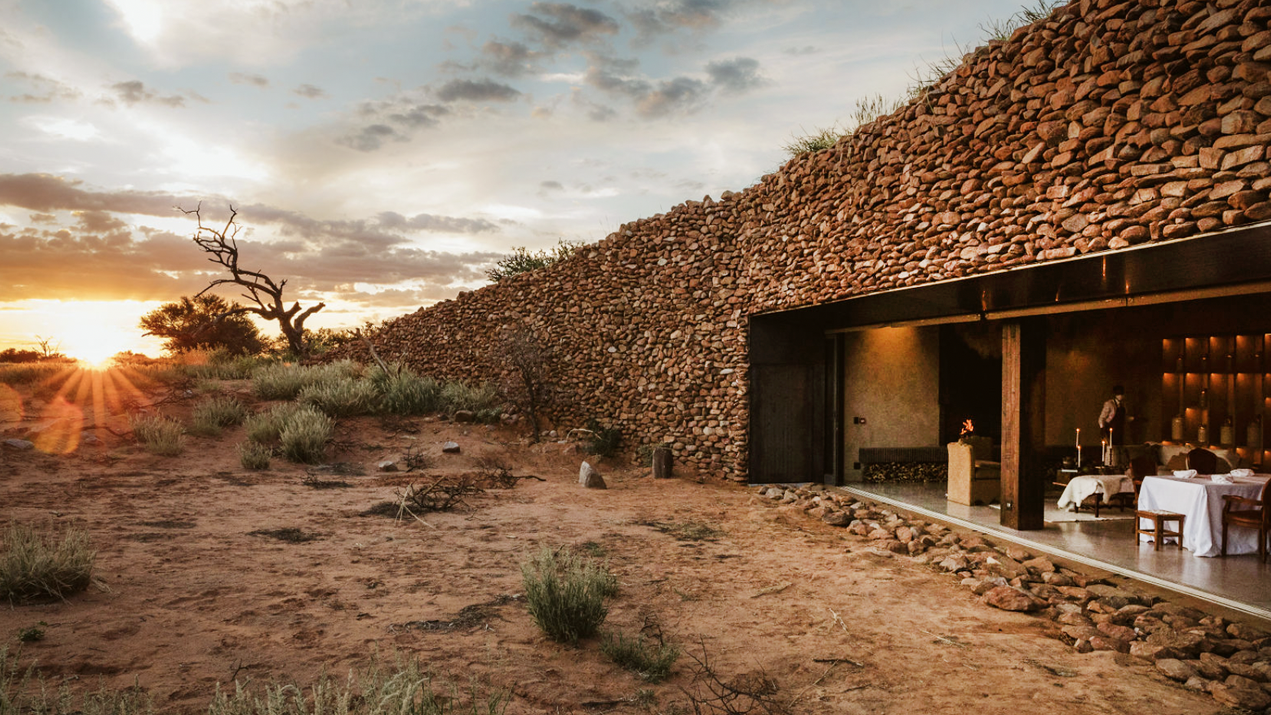
At ROAR AFRICA we believe that travel should inspire, educate, enlighten. That it should be full of wonder and surprise, delight and discovery. And foster a connection with self; while contributing to the community, land and wildlife. There is an art to it though. As a gentle steward for all our travelers, the goal is for us to remove the noise, the complications, the demands that travel induces on all of us. To allow you to move softly and slowly, to allow space and time to descend as you travel both literally and emotionally from head to heart.
One such place that allows this kind of transformative travel experience to unfold is Tswalu in the Kalahari. The rich, red earth and undulating hills, the vast blue skies, the silence, all make for the perfect recipe of space and time.
An inspiring story of regeneration and conservation, the 111 000 hectare reserve – South Africa’s largest private game reserve – represents rebirth on a large scale. Once farmland – gradually rehabilitated by Tswalu’s owners, the Oppenheimer family – it is now a place of abundance, and serves as a triumphant example of what can be achieved over time, with passion, commitment, and cooperation.
It is indeed cooperation that keeps the wheels of nature turning: in the form of animal and avian family units, in a type of “teamwork” between plants, and in inter-species partnerships. You see it all over, but perhaps most obviously in the colonies of sociable weaver birds, typical of this landscape – working, living and building together in the pursuit of protection and community.
A reverence for nature
Tswalu’s camps – The Motse (a contemporary and intimate nine-suite camp) and Tarkuni (an exclusive-use homestead lying in the shadow of the Korannaberg mountains) – are tucked into the uppermost reaches of the Northern Cape in South Africa, and combine all of the Kalahari’s rugged, unique beauty in a luxury travel experience that serves to highlight nature in the most organic and immersive way. Suites merge with the surroundings; their organic design is contemporary and yet does not compete with the splendor of the landscape in which they sit.
They are understated and yet luxurious in every way the modern traveler would expect – from local craft gins and whisky in the suite bar, to scenic outdoor showers and a spacious private deck from which to watch the passing sable as they navigate the camp. Enmeshed with the bush itself, you feel part of the landscape, furthering Tswalu’s mission to inspire its further protection into the future.
This is an entirely standout safari, thanks in part to the people, unique landscape and wildlife here, but largely to Tswalu’s attention to detail and seamless incorporation of its purpose into every element. This reverence for nature comes through from the passionate and knowledgeable team, to the beautifully equipped photographic studio where enthusiasts can print their images, and where the varied conservation and research projects that focus on species both great and small are showcased (the likes of Tswalu’s nearly 80 species of butterfly, pangolin, and white-backed vultures to name a few).
Celebrating local heritage
A reverence for place is also one of the hallmarks of a memorable dining experience. Restaurant Klein Jan is Michelin-star chef Jan Hendrik van der Westhuizen’s eponymous South African outpost, and distills all of what Tswalu and indeed the Kalahari stands for. It exemplifies Tswalu’s commitment to celebrating local provenance, heritage and culture, as part of its journey towards greater sustainability. Working with Tswalu’s executive chef, Marnus Scholly, Jan spent two years researching the flavors, foods and culture of the Northern Cape and the menu is a tribute to the area.
Here, nature’s own ingenuity and resilience, the meeting of past and present, seasonal abundance and renewal, natural rhythms and the celebration of the unique come together in a remarkable culinary journey. Because “journey” really is the only way to describe a meal at Klein Jan, which takes diners on a trip through time. Arriving at a small heritage cottage on the plains of the Kalahari, in the shade of a windmill, the experience begins with a hand-washing ritual with an indigenous vine that is used as soap in the veld: a reminder of the resources to be found in nature.
The power of surprise
Local heritage-inspired snacks and cocktails follow on the nostalgically appointed stoep (porch in Afrikaans), where antiques and collectables have been lovingly curated to transport you back to another era. Once tastes are piqued, guests are led outside and through a seemingly innocuous door, and then, for all intents and purposes, down the rabbit hole. To avoid spoiling the experience for guests still to visit this food and wilderness wonderland, the details are best kept vague – as part of the joy lies in the surprises that await.
But suffice to say it’s an experience where nothing is what it seems. Like the weavers who create a “false” nest to trick snakes and protect their chicks, what initially seems to be one thing, is something else entirely. This paves the way for a delightful series of discoveries – a journey that showcases local produce (wine, meat, cheese, fruit) in an elevated and elegant but authentic fashion.
Everything that travel should do in fact: celebrate context and culture while furthering a larger purpose. Honoring the history of the landscape by planning for a more sustainable future. Allowing a space where you can find what you didn’t know you were looking for.
Come and enjoy this moment of stillness and we can assure you, you will be deeply moved.



